A critical care nurse has been named the Royal Navy’s top reserve recruit of the year.
Sandi Bern, from Glasgow, began Royal Navy Reserve training in 2021 and within a year she was able to Pass Out, and then another year down the line she completed the Leadership Course as a Leading Hand rank thanks to her Nursing degree.
And following all of her hard work, Sandi was this year named as the Top Royal Navy Reservist in Initial Training from the 2022 intake.
According to this news update, “In addition to completing her Leadership Course with Distinction, she was also named top student on that course. In recognition of being the Navy’s Top Reservist, Sandi, pictured right above, was presented with the MacRobert Trust’s Boatswain’s Call Award from Commodore of the Maritime Reserves, Commodore Jo Adey, at the Accelerated Rating Programme Pass out Parade at HMS Raleigh.”
Sandi said:
“A lot of the skills I’ve learned as a Reservist I can use in my own job and civilian life. We get really hands-on fire training with gas masks and do damage repair as well in small spaces as if you are on a ship that is filling up with water. There’s a lot of different experiences and you never hope you’ll find yourself in that kind of situation, but you’d be trained to deal with it if you did, so it’s quite exciting. There’s a great social aspect to it as well. You get to meet loads of different people and there’s great camaraderie. Everyone has different skills and backgrounds from the likes of engineers, dentists and nurses to lawyers so there’s such a range of people.”
As a proud and committed supporter of the Armed Forces for 20 years, NHS Golden Jubilee continues to support military leavers, veterans, reservists, families and spouses and cadets who work for the organisation. Last year, the Golden Jubilee retained the Defence Employer Recognition Scheme (ERS) Gold Award – the highest badge of honour the Ministry of Defence (MoD) awards to employers who support those who serve, veterans and their families.
Sandi, 31, from the Chryston area in Glasgow, has worked at the Golden Jubilee since she qualified as a nurse from University of West of Scotland (UWS) 6 years ago, following in the footsteps of mum and dad who were both nurses, and spent around 18 months in Orthopaedics before moving to critical care.
Outlander
As a Navy Reservist, Sandi is asked to commit to 28 days per year and is supported in her duties at NHS Golden Jubilee, which has Gold Award status in the Defence Employer Recognition Scheme (ERS).
Critical Care Senior Charge Nurse, Sarah Jane Faichney, said:
“As Sandi’s line manager I’m delighted to be involved in the Hospital’s support of her role as a Navy Reservist. She’s obviously dedicated to her Navy activities, but remains fully committed to being a staff nurse within our busy Critical Care department. I am very happy to facilitate flexibility around her hospital shifts, enabling her to attend Navy Reservist training sessions and Sandi always returns very enthusiastic and keen to share stories of her training and fun adventures. As she progresses in her nursing career, it’s obvious she has acquired many transferable skills. I’ve seen this particularly around the leadership she shows when in charge of a shift or when organising the team during emergency situations.”


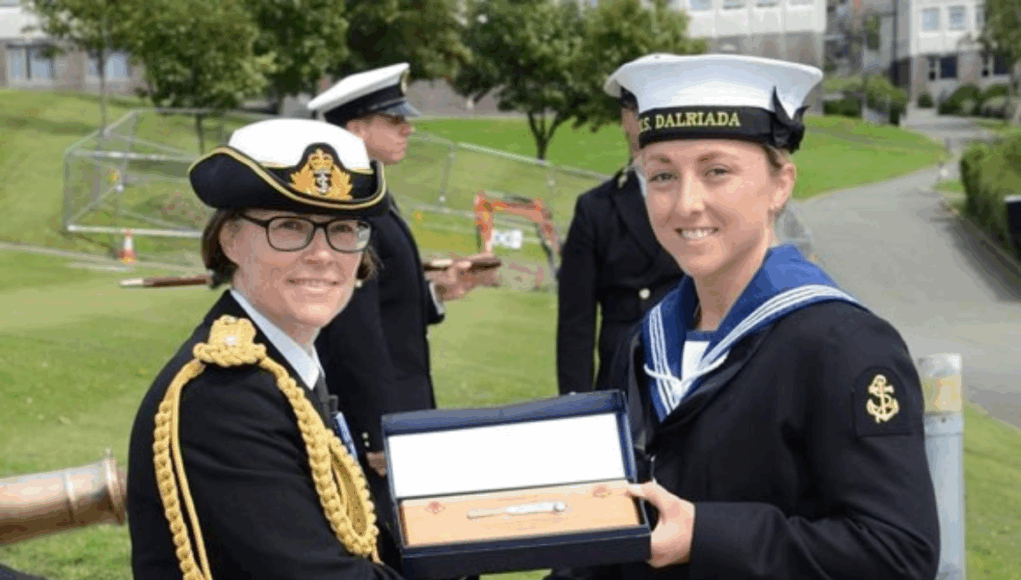
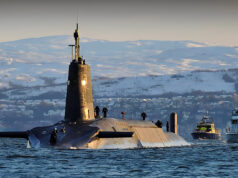
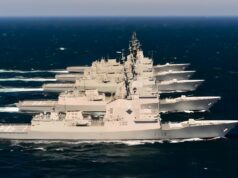
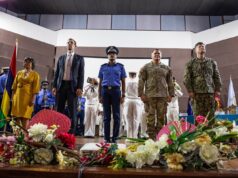
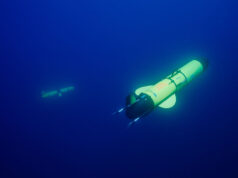
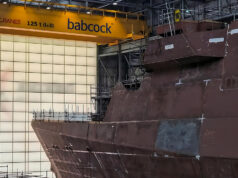

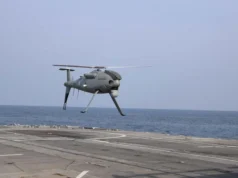
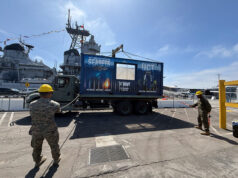
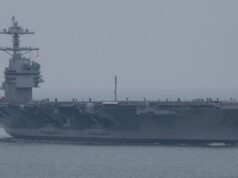
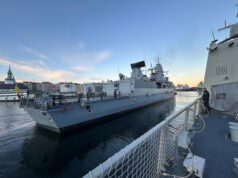

Great to see young committed people enjoying themselves and learning new skills. Congratulations to you.
Get more through RALEIGH quicker I had six weeks basic training which was good e then ten weeks nowadays seems slow to me. Sailors are needed so we should be churning them out as soon as we can.
The quality of the training is what sets us apart.
I have to admit the best teachers I ever had were instructers in the military.
ðŸ‘
And the people
Well done! Nice to see there are still some young people with commitment and some drive to achieve.
OK ..time for additional ignorant questions from an outsider:
1.) Has Ms. Bern been photographed in a RN enlisted uniform or is that a photo of a non-commissioned/warrant officer? In the US military, believe that most nurses, especially registered nurses w/ a bachelor’s degree, are inducted as officers. Realize that customs, practices and traditions are not necessarily interchangeable, but remain curious.
2.) Is HMS Dalriada a training or administrative establishment or a real RN vessel? Again, simply curious. 🤔
Article quoates her rank as Leading Hand which is equivalent to Corporal in the army. I assume if she had wanted to sign up as a commisioned officer you’d have to commit to a certain minimum time period which she may not have wanted to do.
Thanks, appreciate the explanation. ðŸ‘
RN shore facilities carry the HMS prefix.
Thanks, thought that might be the case. ðŸ‘
And they are referred to as concrete frugates
Excellent, rationale for nomenclature convention now understandable. ðŸ‘
The term is Stone Frigates.
Generally speaking, with RNs it’s a mixed bag in the Uk armed forces.
If you enter as a student nurse and are trained at the expense of the. Armed forces you enter as enlisted with enhanced promotion. On qualifying.
If on the other hand you are already qualified and have a degree you can either enlist or become an officer. Individual Choice, essentially the education requirements are exactly the same, the pay is essentially the same for less experienced nurses as is the £30,000 golden handshake. Only difference is you need 2 years post reg experience to apply for a commission.
One thing to note is that as a nurse officer your initial rank and pay is based on your number of years on the register…up to flight lieutenant ( pay step 4 or 5 I think)…which would be the equivalent of a captain in the USAF.
so to round up the ramble..
join as a student nurse after 3 years of as a student, qualify and become a acting corporal, after junior management and leadership course, it’s corporal.
join as a qualified nurse with less than 2 year registration…enlist, acting corporal do junior leaders then corporal.
More than 2 years..enlist or commission..if you have the right specialty ( ED or ITU ) collect golden handshake. If your a charge nurse or sister in the NHS with a lot of experience, you will direct entry into ha higher rank ( max Flight lieutenant).
Ive looked after a lot of budding military nurses in my time as well as managed some who were very senior ( one of my deputies was a group captain) all really good from the students I mentored to the seniors I worked with….Always very interesting and gave interesting views and experiences to the problems we were trying to solve…One of the things I found fascinating ( as a person who had to plan for the worse possible events happening and what we would do if they occurred…as well as piece together decision making when the worst did happen) was that they all Ana always had to manage two forces that legally bound them, one their NMC code of conduct and the other their terms of service…it became very interesting to observe when there was a non registrant in the team of a higher rank than the registered nurse in the clinical team…I always found this bit fascinating as only in the forces could you find a non registrant at a higher rank in a team than a registrant….the NMC code of conduct is clear on this in the the registrant is responsible and accountable for the care the non registrant is providing (health care assistant) ….also the registrant is solely responsible and accountable for the care they provide…this is inshrined in law….basically a nurse is not allowed ( in law) to do something that goes against their profession code of conduct and professional practice…no matter who tells them to…in the NHS I’ve seen nurses flatly refuse to undertake medical orders from consultants..if they felt it breached professional practice..as they are duty bound to do….( I myself as a junior nurse had on occasion to flatly refused in the face of consultants and very senior leaders..when I knew they were wrong and my code of conduct required me to refuse)…there have been entire legal textbooks written on the “dual loyalty†conflict between military orders and GMC ( for drs) and NMC for nurses codes of conduct and the legal implications for military healthcare professionals….as I’ve managed mix teams of NHS and forces personal it’s something that interested me so I did a fair bit of reading on it.
Sorry, somewhat confused. Understood the explanation re RN commissioning. Straightforward, thanks. 😊ðŸ‘
Confused regarding dual role military and civilian nurses (NHS primary, military reserve?) Is military medicine formally linked to NHS, or a matter of personal preference by individual practitioners?
Presume you are associated w/ a contingency planning component w/in NHS. Deal w/ natural and/or man-made disaster recovery planning? Generally, this function is known as Emergency Management in the States. There are local, state and a federal agency (Federal Emergency Management Agency (FEMA)) components, presumably w/ complementary roles. Generally known w/in US for management of natural disaster recovery, uncertain re role in man-made disasters (Civil Defense?). Civil Defense has largely languished w/in the US since the end of Cold War I. However, the state of Hawaii, probably because of proximity to NJ and China and the location of substantial defense installations, apparently has a more active, professional and comprehensive program. Dunno, always thought contingency planning was a reasonably intelligent policy. Uncertain whether Uncle Sugar concurs. Of course, in a general, unrestricted exchange planning/prep. probably would not matter, but there are less dire potential scenarios. 🤔😳😱🤕
Duh…NK…not NJ (New Jersey) 🙄ðŸ˜
Hi Former
The NHS is linked to the military in a number of ways.
1) it provides a very significant amount of the training placements for military medical personal.So you find a lot military nurses having their training in NHS hospitals.
2) The military do not have dedicated hospital anymore and all their none deployed role 4 is basically embedded in the NHS, with all the staff embedded in and working within the NHS there is the royal centre for defence medicine at the Queen Elizabeth hospital Birmingham University hospitals Birmingham NHS trust) which is the primary role four site. Then there are 4 Joint medical groups ( each with around 200 secondary care medical personal) based in/embedded in four Other secondary care NHS Hospital trusts.
Basically when you work in one of these trusts the NHS staff and Military defence team work as one team..so you can have a Military nursing managing a load of NHS staff and an NHS staff member with members of the military in their teams…it basically means that the military staff are constantly able to update their clinical practice working in major trauma and surgical Centers..the same centres that will be directly receiving military casualties as the Airomed teams repat them to the UK. So there are no Military hospitals per say anymore…simply NHS hospitals with embedded military staff.
Also the NHS does a lot of disaster planning, the UK does not have any organisation like FEMA…I think that is probably a function of the federal nature of the U.S.where as in the UK the Police, fire and NHS are all direct executive agencies of the Government…we call them public sector…but in reality what that means is they are direct executive agencies…simple put my ultimate boss is the Priminister..through the Secretary of State for health( department of health) …to NHSE..to my boss then me…so the management of a disaster or major incident in the Uk is managed by what is called a local resilience forum, this is made of of all the category one responders..executive agencies of the government required to respond…basically the NHS, fire, police, public health and county council..each of those agencies is required to be able to set up and run an incident room that controls all the resources of that organisation in time of need…so say a plane crashes or we have a pandemic…each agency sets up its room..the resilience forum meets agrees actions the incident control rooms enact…re meet..enact…re meet enact until the job is done….it is remarkably resilient…I have on occasion managed the NHS incident room overnight from my kitchen table ( which was a bit surreal, but worked well)….it essentially works because we are all essential what in the US you would consider a federal agency.
it makes for an interesting life..as a secondary care clinician, I have been trained in management of nuclear, biological and chemical incidents..up to and including working in a level A hazmat suit, setting up a decontamination centre and decontaminating casualties…using radiological detection equipment…breaking out and using the emergency pods for chemical, biological and nuclear attacks etc…also running and participating in regular major incident training ( we always had pretend airliner crass locally every few years…lots of actors etc)…then latter how to manage an incident room etc…I never got to use the toys thank goodness…but I’ve been in a few lower level major incidents and had to run a room a few times…Major weather events..flooding and snow as well as our two pandemics.
Great post.
Some one else who’s aware of the old MoDHUs. Always found them fascinating and a great idea. One is at Frimley Park, close to me.
Excellent explanation. Thanks Jonathan
There’s. No such thing as an enlisted sailor. Everyone is classed the same a sail is a sailor full stop.
Hmmm…slow news day I think….
Great encouragement to our youngsters to join up, earn a serious, life complementing transferable skill and serve the nation.
Congratulations to LH Bern. Well done.
Hear hear!